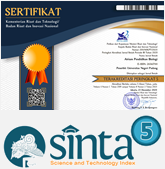The Relationship Between Learning Styles and Biology Cognitive Competency of Senior High School Students
Abstract
Learning styles are a combination of absorbing, regulating, and processing learning by students. There are three types of learning styles namely visual learning styles, auditory and kinesthetic. Based on the results of observations that the authors did at senior high school 7 Padang, it was revealed that the teacher still did not practice the relationship between the learning styles of students in their learning. This can lead to the learning styles are not synchronized with learning models, methods and media applied by teachers so that students' cognitive competency become low. The purpose of this study was to determine the relationship between learning styles and cognitive competency of students. This research is a descriptive research. This study uses a correlation study approach, namely the independent variable in the form of student learning styles and the dependent variable in the form of cognitive competency of students.To find out the relationship between variables stated with correlation coefficients used the Spearman-Rank correlation formula.Based on the research that has been done, it is found that the relationship between learning styles and cognitive competency of students does not mean and the correlation value is in the category of very weak to moderate. In the visual learning style for the second daily test there is a significant relationship and the correlation value is 0.75 with a strong correlation category. The conclusion of this study is that there is no significant relationship between learning styles and learners' cognitive competency.
Keywords
Full Text:
FullpaperReferences
Busato, V.V., Prins, F.J., Elshout, J.J., &Hamaker, C. 2000. Intellectual ability, Learning Style, Personality, Achievement Motivation and Academic Success of Psychology Students in Higher Education.Personality and Individual Differencess.29 (6).
Chania, Y. 2016. Hubungan Gaya Belajar dengan Hasil Belajar Siswa Pada Pembelajaran Biologi Kelas X SMAN 2 Sungai Tarab Kabupaten Tanah Datar.Journal of Saintek.8 (1).
DePorter, B. dan M. Hernacki. 2002. Quantum Learning :Membiasakan belajar nyaman dan menyenangkan. (Terjemahan: Alwiyah Abdurrahman). Bandung: Kaifa.
Fathurrahman, P. 2007. Strategi Belajar Mengajar. Bandung: RefikaAditama.
Hamalik, O. 2008.Dasar Motivasi. Jakarta: GramediaPustakaUtama.
Hidema, P. 2015. Perbandingan Pengaruh Model Pembelajaran Discovery Learning dan Problem Based Learning Berdasarkan Gaya Belajar Siswa Terhadap Kompetensi Biologi Kelas XI IPA di SMAN 1 Bonjol Tahun Ajaran 2014/2015.Thesis. Padang: Universitas Negeri Padang.
Lufri. 2010. Strategi Pembelajaran Biologi. Padang: Universitas Negeri Padang.
Majid, A. 2018.Strategi Pembelajaran. Bandung: Remaja Rosdakarya.
Mulyasa. 2004. Kompetensi Belajar Megajar di Kelas. Jakarta: Nimas Multima.
Mulyono, W.A. Pengaruh Pelatihan Gaya Belajar Terhadap Peningkatan Indeks Prestasi Mahasiswa. Jurnal Keperawatan Soedirman. 2 (3).
Sudjana. 2005. Metoda Statistika. Bandung: Tarsito.
Syah, M. 2003. Psikologi Belajar. Jakarta: Raja GrafindoPersada.
Taiyeb, A.. 2015. Hubungan Gaya Belajar dan Motivasi Belajar dengan Hasil Belajar Biologi Siswa Kelas XI IPA SMA Negeri 1 Taneta Rilau. Jurnal Bionature.
(1).
Uno, H. 2008. Teori Motivasi dan Pengukurannya. Jakarta: Bumi Aksara.
DOI: http://dx.doi.org/10.24036/apb.v4i1.5629
DOI (Fullpaper): http://dx.doi.org/10.24036/apb.v4i1.5629.g2951




